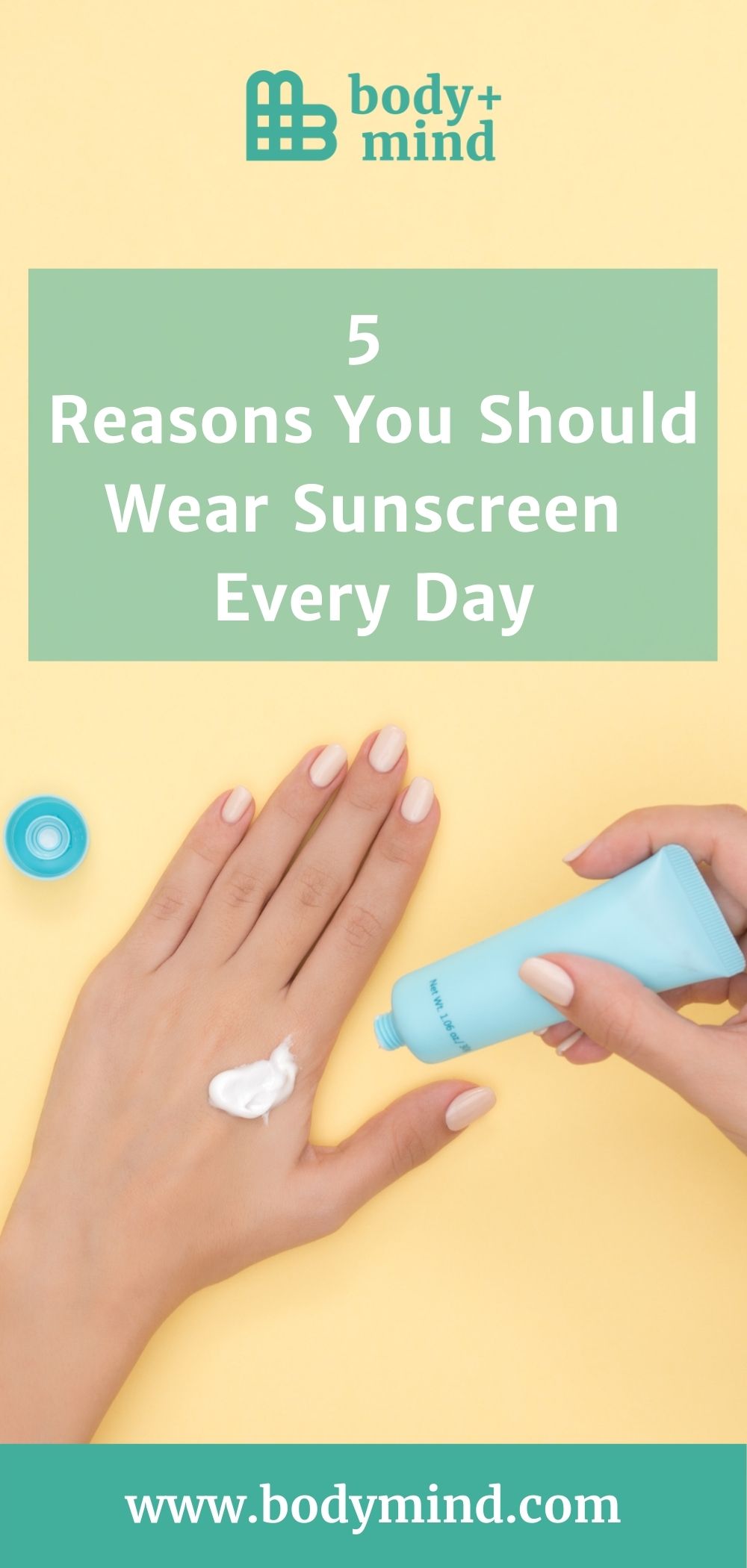
Body + Mind is reader-supported. We may earn an affiliate commission when you buy through some of the links on our site.
Sunscreen is perhaps the most underused and underappreciated part of your skin care routine. It protects your complexion from short-term and long-term damage, yet people seem to forget about it except on hot summer days. Why is that?
According to the CDC, less than 30% of women and 15% of men use sunscreen regularly. Usage was especially low among people with less sun-sensitive skin. However, sunburn is not the only side effect of unprotected skin.
Keep reading to discover five reasons you should wear sunscreen every day!
Everyone enjoys soaking in some vitamin D from the sun. However, all types of ultraviolet radiation are harmful, even in small doses.
Factors that affect UV exposure include:
You should use sunscreen in conjunction with other defensive measures to thoroughly protect you from UV light. For instance, when possible, wear protective clothing, a hat and sunglasses and remain in the shade.
There are three main types of skin cancer: squamous cell carcinoma, basal cell carcinoma and melanoma. By limiting or avoiding exposure to UV radiation, you can decrease your risk of developing one of these cancers.
Sunscreen is one of the simplest ways to protect against harmful radiation. In the United States, 20% of people will develop skin cancer. Using SPF daily keeps you covered regardless of your location or the weather.
Everyone strives to have a youthful and blemish-free complexion! One way to maintain your clear skin is by implementing sunscreen into your daily routine. Sunspots and pigmentation are common side effects of sun exposure without any defense.
Think about the last time you went outside to check the mail or read a book — even brief periods outside can lead to harmful effects without any shielding from UV rays. The amount of time it takes you to put on SPF is a fraction of the time it will take you to attempt to repair skin damage.
With age comes wisdom, but also wrinkles. Slow the signs of aging by wearing sunscreen. A recent study showed that the group who used sunscreen correctly every day showed no detectable skin aging increase after 4.5 years.
Many cosmetics like foundation or setting powder contain SPF. Choose a moisturizer or makeup product with sunscreen to protect your complexion without lengthening your morning process.
Repeated sun damage can make your skin appear dry, leathery and wrinkled. Over time, it will become weaker, leading to bruising and inflammation. Maintain your youthful appearance by staying in the shade and reducing the amount of direct sunlight your body receives. Also, use sunscreen every day to keep yourself covered seven days a week.
No amount of anti-aging creams or procedures will completely reverse the effects of poor skin care. Your best defense is implementing protective measures by using SPF daily.
Even on extremely overcast days, the sun’s rays can penetrate the clouds and make its way to you. UV radiation can also make their way through rain and fog. So while the sun may be out of view, it doesn’t always mean you are far enough away to stay safe from its harmful beams. Some weather, like snow, can reflect sunlight, increasing your exposure.
While staying inside your home may reduce your risk of exposure, it doesn’t guarantee your protection. UVA light can come through the windows in your home, car or workplace. So regardless of your plans for the day, put on sunscreen to help shield your body.
You should use broad-spectrum SPF 15 or above to achieve proper protection from the sun. It’s essential that you cover any visible skin with sunscreen — it’s common for people only to protect their face. Reapply regularly throughout the day, and more frequently if you are swimming or getting wet.
There are two main types of sunscreen: physical and chemical. While both are safe and effective, some people experience irritation from chemical sunscreen types. Products that have ingredients like avobenzone and octisalate are chemical. In comparison, minerals like titanium dioxide and zinc oxide are typical in physical sunscreens.
Regardless of which type you choose, keep in mind the five reasons you should wear sunscreen every day and implement it into your daily routine.

Your email address will only be used to send you our newsletter, and at any time you may unsubscribe. For more information, see our Privacy Policy.